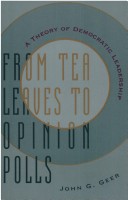Power, Conflict, and Democracy: American Politics into the 21st Century
1 total work
Do politicians lead public life or follow it? Does the nature of representative democracy dictate that those in power respond to popular sentiment? And if public opinion is central to political action, what does it mean for a politician to lead? This book aims to answer these and other fundamental questions on leadership and followership. The author develops an explicit theory to show how the behaviour of politicians, and the unfolding of political change, have been irrevocably altered since the advent of opinion polling in the 1930s. Employing a rational actor perspective, he explores how well-informed politicians behave with marked differences from those who are poorly informed on public opinion. The book describes how well-informed politicians armed with opinion polls are able to isolate and marginalize the "hot-button" issues, locating a position that will augment their support. The result is the erasure of many significant differences between candidates, with political leadership only displayed on less pressing concerns.
